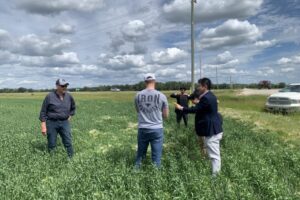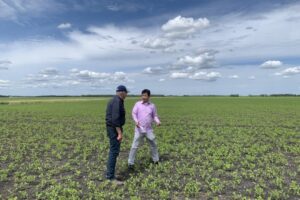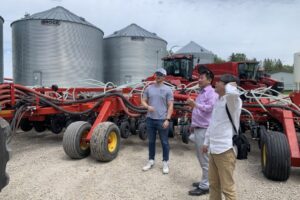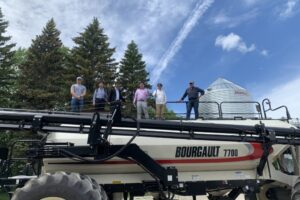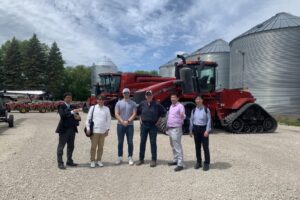Japanese delegation visits Manitoba to gain better understanding of Canadian crop production

On June 27, a delegation from Japan’s Ministry of Agriculture, Forestry and Fisheries (MAFF) toured Manitoba Crop Alliance (MCA) director Doug Martin’s farm near East Selkirk, MB. In addition to Martin, MCA was represented during the farm tour by agronomy extension specialist for cereal crops Andrew Hector.
The tour was an excellent learning experience for the Japanese delegation and a great opportunity for MCA to interact directly with representatives from an important market for Manitoba agricultural products.
Members of the Japanese delegation typically communicate with grain buyers or suppliers, who provide them with information about grain quality and production practices, but they don’t often have the chance to interact with farmers. This led them to reach out to Cereals Canada, who then worked with MCA to help facilitate the event. The delegation had a desire to better understand the practices farmers are using firsthand, which is why they valued participating in the farm tour.
During the tour, members of the MAFF group asked specific and pointed questions regarding crop production practices used on the farm. They were also interested in how specific pieces of equipment work, what fungicides are used and at what frequency, and types and timings of fertilizer application. Additionally, there was a strong interest in on-farm grain storage and how the grain is transported to ports.
The MAFF is important in the Japanese market in that they set the contracts and associated terms for wheat importers that the importers then execute. They also control import regulatory tolerances for cereals.
Japan is a longstanding, quality-conscious purchaser of Canadian wheat. According to Cereals Canada, Japan imported an average of 1.62 million tonnes annually from 2018 to 2022, valued at $631 million. Meanwhile, Manitoba-specific data shows Japan is the province’s third-largest wheat export market, with an annual export average of 325,759 tonnes from 2018 to 2022, valued at $127 million.

